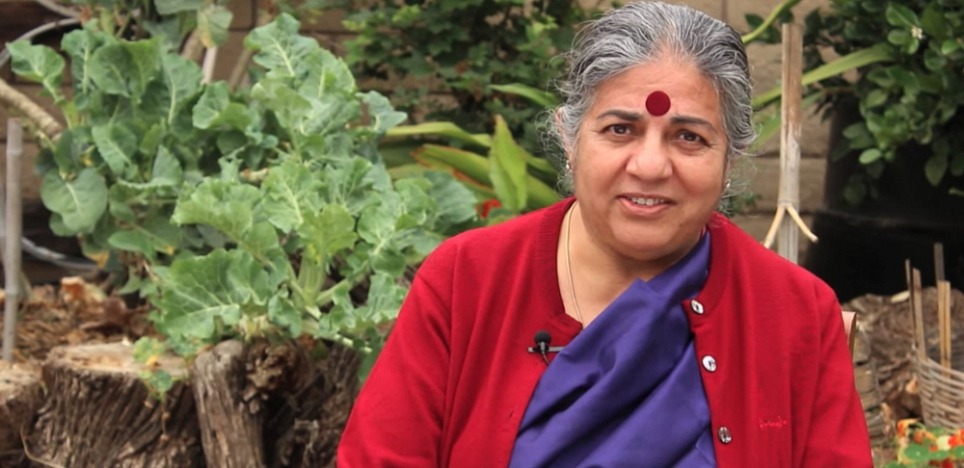Vandana Shiva was born on this day in 1952 in Uttarakhand, India. In this Himalayan forest environment, she learned from her earliest days a sense of non-separation from nature. She chose as a young child to study physics because it helped her understand how the world works. She received a master’s degree in the philosophy of science from Guelph University, Ontario, in 1976 and a PhD in Quantum Theory from the University of Western Ontario in 1978. She says that Quantum Theory taught her how to make connections.
She felt an imperative to return to India, both to answer the puzzle of the disconnect between science and poverty and to satisfy her urge to give back. Because of her book Violence of the Green Revolution, she got invited to a biotech meeting at which she realized what the industry wanted to do with seed: take control of it through patenting.
That's when she started her commitment to save seeds and to promote organic, ecological farming in the hands of small farmers. She explains, "We can't wait for governments and corporations to make the shift. People must." In 1982, she founded the Research Foundation for Science, Technology, and Natural Resource Policy (RFSTN), an organization helping to develop sustainable methods of agriculture. She followed that in 1991 by launching Navdanya — meaning “Nine Seeds” or “New Gift” in Hindi. This national movement protects the diversity and integrity of living resources, especially native seed, with more than 40 seed banks. It also fosters organic farming and fair trade.
Shiva continues to campaign internationally against genetic engineering. Some of her stances — for instance, against genetically modified "golden rice," which contains a precursor to Vitamin A and can help prevent blindness and child mortality — generate controversy. She considers the arguments for GMOs (genetically modified organisms) to be propaganda, and in her many books and her international talks she explores alternatives that do not involve manipulating nature.
To Name This Day . . .
 Quotes
Quotes
Choose one of these quotes that's meaningful for you and use it as a seed for reflection today:
“Those least responsible for climate change are worst affected by it.”
― from Soil Not Oil
"It just so happens that throughout history — every culture — it's women who kept the seed."
— from The Seeds of Vandana Shiva, a documentary directed by Jim Becket
"Biopiracy (is) biological theft; illegal collection of indigenous plants by corporations who patent them for their own use."
— from the booklet No Patents on Seeds
"The fight for truth . . . is not just our right as free citizens of free societies. It is our duty as citizens of the earth."
― in Earth Democracy
 Book
Book
Enjoy this review of Sacred Seed, a tribute to Vandana Shiva filled with colorful photographs and brief essays by spiritual teachers from many traditions with the intent of encouraging your own form of activism.
 Film
Film
 Spiritual Practice
Spiritual Practice
How much do you know about a skill that many of our ancestors depended on to survive: saving seed? A nonprofit called Seed Savers Exchange promotes culturally diverse but endangered garden and food crop heritage for future generations by collecting, growing, and sharing heirloom seeds and plants. You can learn more about this process through this video:
At the Seed Savers Exchange website, you can swap rare seeds through their exchange, shop for seeds in their catalogue, or give a donation to help protect heirloom seeds. Avail yourself of their offerings or in some other way honor Vandana Shiva's mission, affirming that spiritual practices are sometimes literally earthy in nature.
